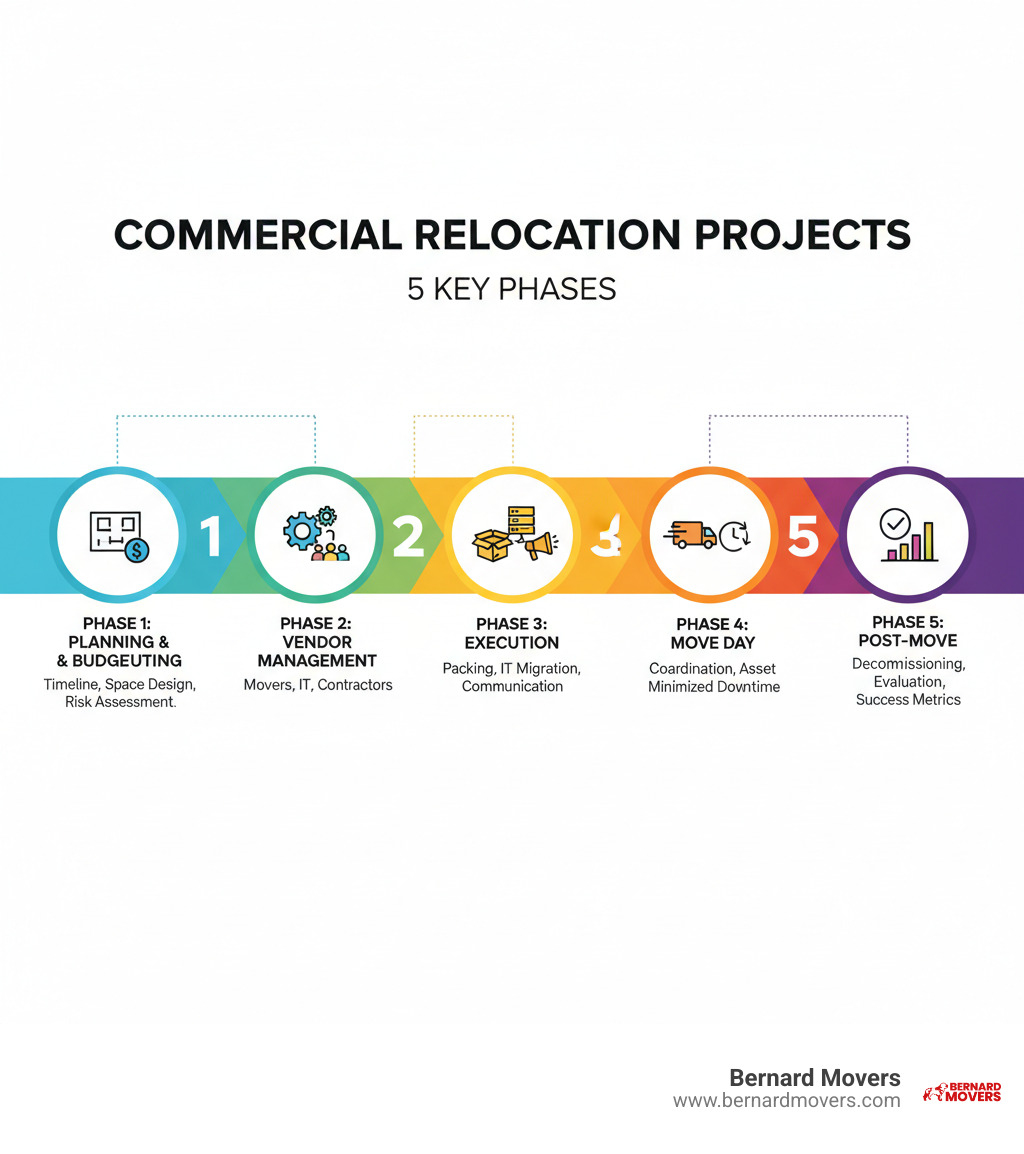Why Commercial Relocation Projects Demand Strategic Expertise
Commercial relocation projects are complex endeavors involving the move of an entire business—from office equipment and IT infrastructure to warehouse inventory—while maintaining business continuity and minimizing downtime. Without strategic expertise, businesses risk significant challenges. One owner attempting a DIY relocation reported a $100,000 budget overrun because the project “consumed MUCH more of my time than I expected.” In contrast, companies using professional project management have achieved remarkable results, including an 80% boost in processing efficiency and $4 million in savings.
Key Components of Successful Commercial Relocation Projects:
- Strategic Planning – Develop detailed timelines, budgets, and contingency plans 2-3 months in advance
- Vendor Coordination – Manage moving companies, IT specialists, furniture installers, and other service providers
- IT Infrastructure Migration – Safely relocate servers, networks, and telecommunications systems with minimal disruption
- Employee Communication – Keep staff informed and engaged throughout the transition process
- Asset Management – Track, protect, and properly decommission equipment and furniture
- Post-Move Evaluation – Assess outcomes and ensure the new space supports operational goals
The stakes are high, as relocations impact productivity, revenue, and stability. Moving an office, warehouse, or manufacturing facility requires precise coordination. Without it, businesses face delays, damaged assets, and extended downtime.
As Mina Georgalas, owner and president of Bernard Movers, I’ve spent nearly 30 years managing commercial relocation projects across Chicago and 45 states. Our family-owned company has built its reputation on turning potentially disruptive moves into streamlined operations that keep businesses running.

Commercial relocation projects terminology:
The Ultimate Guide to Managing Commercial Relocation Projects
Managing commercial relocation projects successfully requires careful orchestration. Think of it as conducting a symphony: every element must perform perfectly at the right moment to create a seamless transition that keeps your business running without missing a beat.

The Essential Planning & Budgeting Phase
Successful commercial relocation projects begin with a planning phase months in advance. This is the foundation for your entire move. The first step is a thorough inventory assessment of your current Chicago or Illinois office space to decide what stays, what goes, and what to replace. This process involves more than just counting desks and chairs; it requires a detailed cataloging of all assets, including IT equipment, specialized machinery, and sensitive documents. We work with you to create a disposition plan, identifying items for liquidation, donation, or recycling, which not only reduces moving costs but also supports corporate sustainability goals. A key cost-saving truth: moving less costs less.
Space planning and design are also tackled early. Your new office layout must optimize productivity. We help create strategic, color-coded floor plans that become invaluable guides on move day for furniture and equipment placement.
Budgeting and cost control are where many DIY moves fail, like the business owner who busted their budget by $100,000. We develop a detailed budget from the start, track expenses, and use competitive bidding and our vendor network to save you money. The investment in professional management is minimal compared to losses from downtime.
Risk assessment is another critical piece. We identify potential problems—delays, damaged assets, compliance issues—and develop contingency plans. Finally, navigating Chicago building permits and local regulations is essential, and we assist in securing them to prevent delays. For a comprehensive look, see our Business Relocation Services Ultimate Guide.
Assembling Your Team & Managing Vendors
Building the right team is the next critical phase in commercial relocation projects. Commercial relocation project management is the process of overseeing every aspect of your move. Our project managers act as your single point of contact, orchestrating the relocation so you can focus on running your business. This includes chairing regular planning meetings with all stakeholders, managing communication flows, and troubleshooting issues as they arise. They are the central hub, ensuring that the movers, IT team, furniture installers, and building management are all synchronized, preventing the costly delays that occur when one vendor’s schedule conflicts with another’s.
Choosing the right provider is key. Our expertise includes space planning, IT coordination, vendor management, and project budgeting. We leverage our established network of trusted Illinois professionals—from IT specialists to electricians—and use competitive bidding to secure better rates. The benefits are clear: reduced stress, cost savings, time efficiency, and minimized disruption. For more on vetting partners, see our Practical Guide to Finding Reliable Commercial Movers. To learn how a manager transforms your move, explore our page on Office Relocation Project Manager.
Executing the Move: Minimizing Downtime and Disruption
The execution phase is where planning meets action. Our primary goal is to minimize downtime so your Chicago or Illinois business operates smoothly. We plan every step, from professional packing and labeling to secure transport and setup. For guidance on handling equipment, our Moving Office Equipment guide is a great resource.
Managing IT and telecommunications infrastructure is the most critical aspect. This involves assessing needs, managing server and cabling transfers with minimal downtime, and testing all systems post-move. A detailed IT migration plan is crucial. This includes mapping the new network infrastructure, planning for data backup and recovery, and coordinating with your internal IT team or external vendors. We ensure that every workstation, server, and phone is reconnected and fully functional before your employees arrive, turning a potentially chaotic process into a seamless ‘plug-and-play’ experience. Our strategic approach once reduced a potential week-long IT outage to a fraction of that time.
Employee communication and satisfaction are paramount. Effective change management helps your team adapt. We use proven communication strategies—like early announcements, FAQs, and new office orientations—to prepare staff, address concerns, and make the transition a positive experience. We also offer flexible scheduling, including nights and weekends, to avoid interrupting your operations.
For more on the tools used in large-scale relocations, explore widely adopted project management tools and checklists that support complex moves across Illinois. The Project Management Institute offers valuable resources on best practices for managing complex business transitions.
Post-Move: Decommissioning and Evaluating Success
The work isn’t over when the last box arrives. The post-move phase of commercial relocation projects includes decommissioning the old space and evaluating success.
Decommissioning is essential to avoid landlord fines. We prepare your former space for new tenants by emptying it, finding buyers for unneeded assets, and recycling materials. We handle removing cabling, disassembling furniture, and making minor repairs to return the space to a “broom-swept” condition, as most commercial leases require. This process saves money and minimizes environmental impact. For more, see our Office Move Out Cleaning service.
Once you’re settled in your new Chicago or Melrose Park location, we evaluate how well the project achieved its goals. We measure success through key metrics: Was downtime minimized? Did the project stay on budget? Are employees productive in the new space? Has the layout improved workflows? This feedback helps optimize your new workspace for efficiency and well-being.
Overcoming Common Challenges in commercial relocation projects
Even with meticulous planning, commercial relocation projects can present challenges. Recognizing them is key to a successful move.
- Budget overruns: We prevent this with detailed budgets, close expense tracking, and competitive vendor pricing.
- Delays: Our proactive risk management and contingency planning help us adapt quickly to keep your project on schedule.
- Asset Protection: We use professional packing, specialized equipment, and detailed inventory management to safeguard your belongings and prevent damage. We also help with insurance requirements. See our Office Moving Considerations for more.
- Regulatory Compliance & Data Security: Our expertise in Illinois regulations ensures compliance, and we partner with IT experts to handle sensitive data securely.
Understanding the key differences between commercial and residential moves highlights the need for specialized expertise:
| Feature | Commercial Relocation Projects | Residential Relocation Projects |
|---|---|---|
| Scope | Complex, vast logistical coordination | Simpler, focuses on household goods |
| Downtime Impact | Critical; every hour costs money | More flexible with less financial pressure |
| Complexity | High; multiple stakeholders, specialized equipment | Lower complexity, fewer stakeholders |
| Impact on Business | Very high; potential for significant disruption | Personal impact only |
The Future of Office Moves: Technology and Trends
The landscape of commercial relocation projects is evolving with technology and new workplace expectations.
Technology is transformative. Advanced project management software and DCIM systems allow for real-time tracking and precise execution of complex IT moves. Sustainable moving practices, such as recycling and asset liquidation, are now standard, benefiting both the environment and your budget.
Hybrid work models and a focus on employee experience have changed office design. We help clients in Chicago and Melrose Park create flexible, ergonomic spaces with collaboration zones and wellness amenities to attract and retain talent. This includes integrating smart building technologies for improved efficiency and comfort. For more on modern office planning, see our New Office Setup guide.
Conclusion: Ensuring Your Business Thrives Post-Relocation
A business move is more than just logistics; it’s about protecting your operations and positioning your company for future success. Throughout this guide, we’ve shown how commercial relocation projects demand strategic expertise, meticulous planning, and experienced coordination.
The difference between a chaotic move and a seamless one is professional management. Avoid the $100,000 budget overruns of DIY moves and aim for the efficiency boosts and savings that expert oversight provides. The stakes are real, and the outcomes are dramatically different.
Business continuity isn’t just a buzzword—it’s your livelihood. We focus on minimizing downtime, keeping your employees productive, and ensuring your new space is optimized from day one. From initial planning through post-move decommissioning, every phase deserves expert attention.
For nearly 30 years, Bernard Movers has been the partner businesses trust for relocations across Chicago, Melrose Park, and throughout Illinois. We’ve managed everything from small office moves to complex warehouse relocations, and we know that your business has unique needs.
Whether you’re expanding, consolidating, or finding a space that better serves your team, the right moving partner transforms a stressful transition into an opportunity for positive change.
Ready to plan your business relocation with a team that understands what’s at stake? Get expert help with your next move and find how strategic planning and experienced execution make all the difference. And if you’re relocating to Georgia or Florida, ask us about our 20% additional discount on moves booked for delivery by March 15, 2025.
Your business deserves a move that’s as professional as you are. Let’s make it happen.

